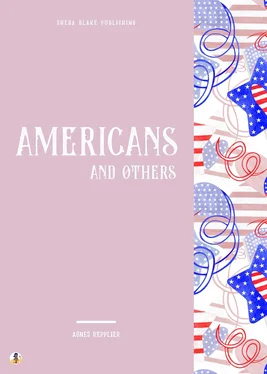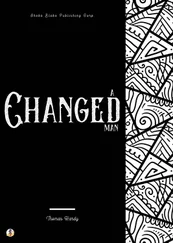Sheba Blake - Americans and Others
Здесь есть возможность читать онлайн «Sheba Blake - Americans and Others» — ознакомительный отрывок электронной книги совершенно бесплатно, а после прочтения отрывка купить полную версию. В некоторых случаях можно слушать аудио, скачать через торрент в формате fb2 и присутствует краткое содержание. Жанр: unrecognised, на английском языке. Описание произведения, (предисловие) а так же отзывы посетителей доступны на портале библиотеки ЛибКат.
- Название:Americans and Others
- Автор:
- Жанр:
- Год:неизвестен
- ISBN:нет данных
- Рейтинг книги:5 / 5. Голосов: 1
-
Избранное:Добавить в избранное
- Отзывы:
-
Ваша оценка:
- 100
- 1
- 2
- 3
- 4
- 5
Americans and Others: краткое содержание, описание и аннотация
Предлагаем к чтению аннотацию, описание, краткое содержание или предисловие (зависит от того, что написал сам автор книги «Americans and Others»). Если вы не нашли необходимую информацию о книге — напишите в комментариях, мы постараемся отыскать её.
Americans and Others — читать онлайн ознакомительный отрывок
Ниже представлен текст книги, разбитый по страницам. Система сохранения места последней прочитанной страницы, позволяет с удобством читать онлайн бесплатно книгу «Americans and Others», без необходимости каждый раз заново искать на чём Вы остановились. Поставьте закладку, и сможете в любой момент перейти на страницу, на которой закончили чтение.
Интервал:
Закладка:
Eliminating all the more obvious features of criticism, as throwing no light upon the subject, we come to the consideration of three points,—the domestic, the official, and the social manners of a nation which has been roundly accused of degenerating from the high standard of former years, of those gracious and beautiful years which few of us have the good fortune to remember. On the first count, I believe that a candid and careful observation will result in a verdict of acquittal. Foreigners, Englishmen and Englishwomen especially, who visit our shores, are impressed with the politeness of Americans in their own households. That fine old Saxon point of view, “What is the good of a family, if one cannot be disagreeable in the bosom of it?” has been modified by the simple circumstance that the family bosom is no longer a fixed and permanent asylum. The disintegration of the home may be a lamentable feature of modern life; but since it has dawned upon our minds that adult members of a family need not necessarily live together if they prefer to live apart, the strain of domesticity has been reduced to the limits of endurance. We have gained in serenity what we have lost in self-discipline by this easy achievement of an independence which, fifty years ago, would have been deemed pure licence. I can remember that, when I was a little girl, two of our neighbours, a widowed mother and a widowed daughter, scandalized all their friends by living in two large comfortable houses, a stone’s throw apart, instead of under one roof as became their relationship; and the fact that they loved each other dearly and peacefully in no way lessened their transgression. Had they shared their home, and bickered day and night, that would have been considered unfortunate but “natural.”
If the discipline of family life makes for law and order, for the subordination of parts to the whole, and for the prompt recognition of authority; if, in other words, it makes, as in the days of Rome, for citizenship, the rescue of the individual makes for social intercourse, for that temperate and reasoned attitude which begets courtesy. The modern mother may lack influence and authority; but she speaks more urbanely to her children than her mother spoke to her. The modern child is seldom respectful, but he is often polite, with a politeness which owes nothing to intimidation. The harsh and wearisome habit of contradiction, which used to be esteemed a family privilege, has been softened to a judicious dissent. In my youth I knew several old gentlemen who might, on their death-beds, have laid their hands upon their hearts, and have sworn that never in their whole lives had they permitted any statement, however insignificant, to pass uncontradicted in their presence. They were authoritative old gentlemen, kind husbands after their fashion, and careful fathers; but conversation at their dinner-tables was not for human delight.
The manners of American officials have been discussed with more or less acrimony, and always from the standpoint of personal experience. The Custom-House is the centre of attack, and critics for the most part agree that the men whose business it is to “hold up” returning citizens perform their ungracious task ungraciously. Theirs is rather the attitude of the detective dealing with suspected criminals than the attitude of the public servant impersonally obeying orders. It is true that even on the New York docks one may encounter civility and kindness. There are people who assure us that they have never encountered anything else; but then there are people who would have us believe that always and under all circumstances they meet with the most distinguished consideration. They intimate that there is that in their own demeanour which makes rudeness to them an impossibility.
More candid souls find it hard to account for the crudity of our intercourse, not with officials only, but with the vast world which lies outside our narrow circle of associates. We have no human relations where we have no social relations; we are awkward and constrained in our recognition of the unfamiliar; and this awkwardness encumbers us in the ordinary routine of life. A policeman who has been long on one beat, and who has learned to know either the householders or the business men of his locality, is wont to be the most friendly of mortals. There is something almost pathetic in the value he places upon human relationship, even of a very casual order. A conductor on a local train who has grown familiar with scores of passengers is no longer a ticket-punching, station-shouting automaton. He bears himself in friendly fashion towards all travellers, because he has established with some of them a rational foothold of communication. But the official who sells tickets to a hurrying crowd, or who snaps out a few tart words at a bureau of information, or who guards a gate through which men and women are pushing with senseless haste, is clad in an armour of incivility. He is wantonly rude to foreigners, whose helplessness should make some appeal to his humanity. I have seen a gatekeeper at Jersey City take by the shoulders a poor German, whose ticket called for another train, and shove him roughly out of the way, without a word of explanation. The man, too bewildered for resentment, rejoined his wife to whom he had said good-bye, and the two anxious, puzzled creatures stood whispering together as the throng swept callously past them. It was a painful spectacle, a lapse from the well-ordered decencies of civilization.
For to be civilized is to be incapable of giving unnecessary offence, it is to have some quality of consideration for all who cross our path. An Englishwoman once said to Mr. Whistler that the politeness of the French was “all on the surface,” to which the artist made reply: “And a very good place for it to be.” It is this sweet surface politeness, costing so little, counting for so much, which smooths the roughness out of life. “The classic quality of the French nation,” says Mr. Henry James, “is sociability; a sociability which operates in France, as it never does in England, from below upward. Your waiter utters a greeting because, after all, something human within him prompts him. His instinct bids him say something, and his taste recommends that it should be agreeable.”
This combination of instinct and taste—which happily is not confined to the French, nor to waiters—produces some admirable results, results out of all proportion to the slightness of the means employed. It often takes but a word, a gesture, to indicate the delicate process of adjustment. A few summers ago I was drinking tea with friends in the gardens of the Hotel Faloria, at Cortina. At a table near us sat two Englishmen, three Englishwomen, and an Austrian, the wife of a Viennese councillor. They talked with animation and in engaging accents. After a little while they arose and strolled back to the hotel. The Englishmen, as they passed our table, stared hard at two young girls who were of our party, stared as deliberately and with as much freedom as if the children had been on a London music-hall stage. The Englishwomen passed us as though we had been invisible. They had so completely the air of seeing nothing in our chairs that I felt myself a phantom, a ghost like Banquo’s, with no guilty eye to discern my presence at the table. Lastly came the Austrian, who had paused to speak to a servant, and, as she passed, she gave us a fleeting smile and a slight bow, the mere shadow of a curtsey, acknowledging our presence as human beings, to whom some measure of recognition was due.
It was such a little thing, so lightly done, so eloquent of perfect self-possession, and the impression it made upon six admiring Americans was a permanent one. We fell to asking ourselves—being honestly conscious of constraint—how each one of us would have behaved in the Austrian lady’s place, whether or not that act of simple and sincere politeness would have been just as easy for us. Then I called to mind one summer morning in New England, when I sat on a friend’s piazza, waiting idly for the arrival of the Sunday papers. A decent-looking man, with a pretty and over-dressed girl by his side, drove up the avenue, tossed the packet of papers at our feet, and drove away again. He had not said even a bare “Good morning.” My kind and courteous host had offered no word of greeting. The girl had turned her head to stare at me, but had not spoken. Struck by the ungraciousness of the whole episode, I asked, “Is he a stranger in these parts?”
Читать дальшеИнтервал:
Закладка:
Похожие книги на «Americans and Others»
Представляем Вашему вниманию похожие книги на «Americans and Others» списком для выбора. Мы отобрали схожую по названию и смыслу литературу в надежде предоставить читателям больше вариантов отыскать новые, интересные, ещё непрочитанные произведения.
Обсуждение, отзывы о книге «Americans and Others» и просто собственные мнения читателей. Оставьте ваши комментарии, напишите, что Вы думаете о произведении, его смысле или главных героях. Укажите что конкретно понравилось, а что нет, и почему Вы так считаете.












